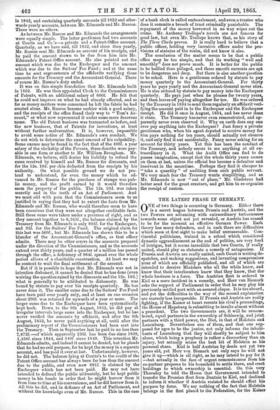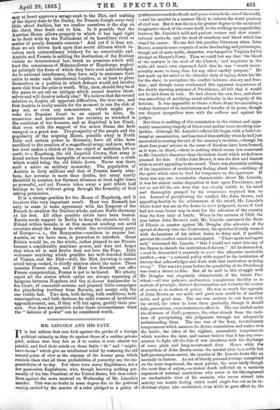THE LATEST PHASE IN GERMANY.
ONE of two things is occurring in Germany. Either there is a secret league between Prussia and Austria, and the two Powers are advancing with extraordinary tortuousness towards some object not yet revealed, or Austria has ceased to be for the moment an effective German Power. Each theory has many defenders, and in each there are difficulties which seem at first sight to make belief unreasonable. Con- tinental politicians, trained in a school which, considered dynastic aggrandizement as the end of politics, are very fond of intrigue, but it seems incredible that two Courts, if really united, should play so elaborate a comedy of antagonism. If Prussia and Austria are really united, each Court is writing de- spatches, and making suggestions, and inventing compromises none of which are officially published, and all of which are intended to deceive Ministers who all the while know, and know that their interlocutors know that they know, that the whole business is a farce. The Austrian fleet is ordered to Kid as a mere incident in a comedy, and Herr von Bismark asks the support of Parliament in order that he may play his previously-settled part with an assured claque. It is too absurd, and yet the difficulties in the way of the second explanation are scarcely less insuperable. If Prussia and Austria are really fighting, if the Kaiser at heart resents his rival's proceedings, the House of Hapsburg is submitting to insults almost without a precedent. The two Governments are, it will be reniem- bered, equal partners in the ownership of Schleswig, and joint partners with a third power, the Diet, in that of Holstein and Lauenburg. Nevertheless one of them, and that one sup- posed for ages to be the junior, not only informs the inhabi- tants of Lauenburg that they will shortly be subject to hiro alone, which being a prophecy is rather a discourtesy than an injury, but actually seizes the best bit of Holstein as. his personal share. Kid is half Austrian by deeds not yet two years old, yet Herr von Bismark not only says he will net give it up—which is all right, as he may intend to pay for it —but actually in the face of urgent remonstrances from his. co-partner proposes to his household to settle there, and erect buildings to which ownership is essential. On this very Thursday he told the House that Government intended to transfer the Prussian fleet from Dantzic to Kiel, and declined to inform it whether if Austria resisted he should effect his
• purpose by force. We say nothing of the fact that Holstein belongs in the first placed to the Federation, for the Kaiser
Buy at heart approve a savage snub to the Diet, and no.thing of the injury done to the Duchy, for Francis Joseph cares very Little about duchies, but we confine ourselves to the slap on the cheek thus dealt out to him. Is it possible that the Austrian House allows property to which it has legal right to be dealt with by the Parliament of its hereditary rival as matter of purely domestic concern ? And yet if it does not, then we are driven back upon that secret affiance which in- volves such extraordinary trickery for no conceivable end. Austria and Prussia in settling the destination of the Duchies violate no international law, break no promises which will hurt the consciences of Hohenzollems or Hapsburgs, neglect no principle the force of which they have ever acknowledged. As to external interference, they have only to announce their union to make such interference hopeless, or at least to place themselves in a position in which defence would not involve more risk than the prize is worth. Why, then, should they be at the pains to act out an intrigue which cannot deceive them- selves and will deceive nobody else? We believe that the second solution is, despite all apparent difficulties the true one, and that Austria is really unable for the moment to run the risk of any act, or even any remonstrance, which might pro- voke the Prussian Court to an appeal to force. So numerous and inveterate are her enemies, so wretched is the condition of her finances, and so dispirited is her Court, that even with the support of the minor States she feels unequal to a great war. The prosperity of the people and the popularity of the reigning House, possible sway in North Italy and certain power in Germany, have all alike been sacrificed to the creation of a magnificent army, and now, when her rival makes a clutch at the one object of ambition left on earth to a Hapsburg, the old Imperial Crown, that army is found useless because incapable of movement without a crash which would bring the old fabric down. Never was there such a satire on military monarchy. The population of Austria is forty millions and that of Prussia barely nine- teen, her revenue is more than double, her army nearly threefold in number, her German alliances at least eight times as powerful, and yet Prussia takes away a port which half belongs to her without going through the formality of first asking permission.
It is a strange position for the House of Hapsburg, and it involves this very important result. Herr von Bismark has only to come to some agreement with the Emperor of the French to swallow the Duchies whole, and see North Germany at his feet. All other possible rivals have been beaten. Russia needs support in Berlin to keep the chronic revolt in Poland within bounds, is at this moment sending out acrid circulars about the danger to which the revolutionary party of Europe—i. e., the Bonapartes—continue to expose her. Austria, as we have seen, is powerless to interfere. Great Britain would be, on the whole, rather pleased to see Prussia become a considerable maritime power, and does not forget that when all is said Berlin does not love the Pope. Italy welcomes anything which gratifies her well-founded dislike of Vienna, and the Diet—well, the Diet, knowing it cannot avoid being cooked, is chiefly anxious about the sauce. There remains France alone, and if Herr von Bismark can offer France compensation, France is not to be feared. We utterly reject all the stories which exiles are always repeating of bargains between Napoleon and the ci-devant Ambassador to his Court, of concerted cessions and planned little campaigns for plundering territory from Bavaria, and accept only the one visible fact. Two men, both daring, both ambitious, both unscrupulous, and both desirous for solid reasons of territorial aggrandizement, can, if they will but agree, gratify their pas- sion. One does not perceive under those circumstances what the "balance of power" can be considered worth.































 Previous page
Previous page